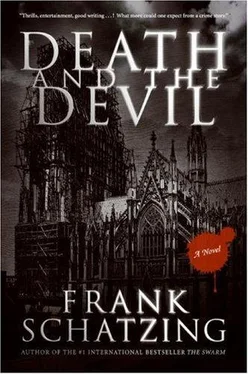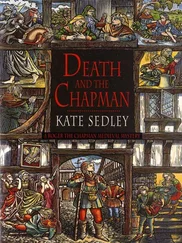“But there were only two. Or am I wrong?”
“There were three.”
“There were?” Matthias stroked his lips. “I must be getting old. But three is better, of course.”
“It is not. The third was not part of the plan.”
Matthias stared at the marks of his teeth in the pear. “Tell me.”
“There was a thief,” explained Urquhart. “Presumably stealing the archbishop’s fruit. He saw me push Gerhard off the scaffolding. Too stupid. I had no idea he was stuck in that tree, until he fell out. Presumably from sheer fright.” He sucked the air in through his teeth contemptuously.
“What now?” exclaimed Matthias, somewhat horrified.
“Keep your voice down. We have a witness who can tell the good citizens of Cologne the opposite. That Gerhard did not slip.”
“Who’s going to believe a beggar, a thief?”
“No one, I should imagine.” Urquhart stopped. His eyes glinted at Matthias from under the hood. “But do you want to take the chance?”
“What do you mean, me?” spluttered Matthias. “It’s your fault.”
“No.” Urquhart’s rejoinder was calm. “You can’t know every bird roosting in the branches. Not even I can. But don’t start complaining too soon. There’s more. It is possible—though I wouldn’t swear to it—that Gerhard said something to the man.”
“What? I thought Gerhard was dead! This is getting more and more confusing.”
Urquhart gave a soft smile. “He died. That is not the same as being dead. Dying men can change their wills or curse God, all in the last moment before they pass away. An architect in his death throes, for example, might well mention your name.”
Matthias grasped Urquhart’s arm and stood blocking his way. “I do not find that funny,” he hissed. “Why didn’t you catch the bird?”
“I did attempt to.” Urquhart walked on and Matthias had to get out of his way quickly. Furious, he hurled the remains of his pear at a house door and continued on his walk with his presumed spiritual adviser.
“And what was the result of your—attempt?”
“At some point or other I lost track of him.”
“Then he’s probably been telling his story all over the place.” Matthias groaned. “Half of Cologne will have heard it by now.”
“Yes, he did tell some. They’re dead.”
“What?” Matthias thought he must have misheard. They hadn’t yet reached the pan makers, so the ringing in his ears couldn’t be coming from their constant hammering.
Urquhart shrugged his shoulders. “I did what was necessary.”
“Wait.” Matthias tried to recover his composure. “You mean you’ve killed more people?”
“Of course.”
“Saints preserve us!”
“Leave the saints out of this,” said Urquhart. “What does it matter if I gave Morart a few companions on his road to hell? If I understand you right, you’re more interested in the success of your plan than the welfare of your fellow citizens.”
He went over to a stall selling smoked honey slices and sweet cakes with nuts. There was an appetizing smell. A coin changed hands. Urquhart started chewing and offered Matthias a piece.
“Like some?”
“No, goddammit.”
They walked along in silence. The street was getting crowded with people buying and selling, checking goods, haggling with embroiderers, or simply going about their business. A gang of squealing children came running from the area that echoed with the hammering of the smiths and pan makers. It was one of their favorite games to ask the men, who were all half deaf from the ear-splitting racket, the time, then run away before the inevitable hammer came flying after them.
“You don’t need to worry,” said Urquhart.
“I don’t need to worry!” Matthias gave an angry laugh. “There’s someone running around the town who could ruin everything and you’re calmly eating cake!”
“We’ll find him.”
“Who’s ‘we’?”
“I need a few men. Naturally I wouldn’t bother you with this if it weren’t so urgent, but I haven’t time to go looking for them myself, as I did for the witnesses. Give me three or four of your servants, the fastest, if you don’t mind my suggesting it.”
“God damn you! Do you at least know who you’re looking for?”
“Yes,” said Urquhart, stuffing the last piece of cake into his mouth. It made Matthias feel sick just to watch him.
“And? What’s he called? What does he look like? Well?”
Urquhart wiped the crumbs from the corners of his mouth. “Short, slim, red hair. Fiery red. Name of Jacob.”
Matthias stopped in his tracks, thunderstruck. The ground seemed to tremble under his feet. “Tell me it’s not true,” he whispered.
In a flash Urquhart’s casual air had given way to alert concentration. “Why?”
“Why?” Matthias shook his head. “Because—no, it’s just not possible!—because less than an hour ago I gave this Jacob a guilder.”
Urquhart’s bushy brows contracted. Now he was the one to be flabbergasted. “You did what?” he asked softly.
“One guilder. Jacob the Fox. He was going through strange contortions outside our house in Rheingasse. It almost looked as if he were trying to—trying to cover up his hair.”
Of course. What else. It was all so obvious.
“Jacob the Fox,” muttered his companion. “A fox indeed.”
“And like an ass, I gave him a guilder.”
“And now you’re getting your just reward,” said Urquhart with a malicious sneer.
For one dreadful moment Matthias Overstolz, nephew of the head of one of the richest and most powerful of the noble houses and a man of wealth and influence himself, felt wretched and impotent. Then his fury boiled up. Enough of this wailing and gnashing of teeth; it was time to act.
“Let’s get the men,” he said, turning back. “I’ll give you a dozen of my servants. I’ll see if I can find a few soldiers as well. We’ll tell them who this Fox is—what he is, a thief in whose capture the Overstolz family has a keen interest.”
“I will have to speak to them,” said Urquhart.
“Is that unavoidable?”
“Yes.”
“It’s no problem with the servants. In your habit I can take you into the house. Behave like a real monk, a friend of the family. We were talking about bringing a thief to his God-ordained punishment and you, in your wisdom, had an idea about how it might be done.”
Urquhart nodded. “And what is this thief supposed to have stolen?”
Matthias thought. Then he had an idea. An amusing idea. He gave a grim smile. “Let’s say he stole some money from me. Yes, that’ll do. He stole some money. A gold guilder.”
St. Mary Magdalene’s was, indeed, not a particularly impressive example of ecclesiastical architecture. It even looked somewhat dilapidated. The priests, canons, and suffragans of the city complained often enough that they could not manage on their tithes, so where should they find money for the upkeep of buildings? That was an exaggeration, at least to the extent that, thanks to substantial donations from tradesmen, merchants, and patricians, the big churches were resplendent and there was, after all, sufficient money for a new cathedral. Small parish churches like St. Mary Magdalene’s, however, were dependent on their own congregation and funds were naturally not so abundant.
St. Mary Magdalene’s looked all the more shabby as it stood opposite St. Severin’s, whose imposing stone spire made it clear where God would spend the night if He should happen to be in the district.
Modest as it was, however, the little church was a feast for the eyes compared with the box where Richmodis’s uncle lived. It was one of a row of a dozen or so crooked little houses that looked like a line of drunks about to collapse. Her father and uncle, Richmodis told Jacob, would swear blind the houses all stood as upright as the emperor’s bodyguard, but that was an optical illusion resulting from the fact that as often as not they were inclined at a similar angle to their architectural environment themselves.
Читать дальше












